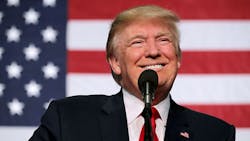Trump Faces Laugh Test as He Weighs 'Nuclear Option' for Steel
U.S. Trade Representative Robert Lighthizer was a lawyer working on behalf of the steel industry when it was pressing President Bill Clinton for help in 2000. One idea that came up: Declare steel critical to national security under a rarely used trade rule so it’s eligible for protection from imports.
The suggestion to even launch a so-called Section 232 investigation was dismissed out of hand because -- in the words of a member of Clinton’s Council of Economic Advisers Robert Lawrence -- “it didn’t pass the laugh test.” Only 3% of the steel produced in the U.S. went for defense.
That’s still the case today. But it hasn’t stopped Lighthizer and Commerce Secretary Wilbur Ross from pursuing a Section 232 investigation of steel. And, based on public comments from President Donald Trump himself, it also may not prevent them from deciding as early as this week that the alloy is indeed vital to national security.
“Wait’ll you see what I’m going to do for steel and for your steel companies,” Trump said in a June 7 speech in Cincinnati, Ohio. “We’re going to stop the dumping.”
There’s a lot at stake. Section 232 has been characterized as the nuclear option on trade. It grants the president widespread latitude to aid the domestic industry concerned and shelter it from competition from abroad. If the U.S. invokes it for steel, the risk is that other countries will follow suit for other sectors of their economies, potentially undermining the open trading regime that’s been in place for 70 years.
Trade War 'If Not Used Judiciously'
This could “give the green light to our trading partners to also restrict imports on national security grounds,” Wendy Cutler, who was acting deputy U.S. trade representative under President Barack Obama, told Bloomberg television on June 20. It “could lead to a trade war if not used judiciously.”
An announcement this week also would come just days ahead of the July 7-8 summit of leaders from the Group of 20 economies in Hamburg, Germany. German Chancellor Angela Merkel has said she expects trade to be a central topic of discussion at the meeting, adding that she anticipates some push-back from the Trump administration to her anti-protectionist stance.
There’s no doubt that steel is a troubled industry worldwide. Global production capacity exceeded demand by more than 700 million metric tons in 2015, according to the Organization for Economic Cooperation and Development. Most of the excess is in China, which has boosted output more than six-fold since 2000.
U.S. producers have won protection from Chinese exports as Washington has slapped duties on shipments from the Asian nation. U.S. imports from China have plunged as a result, to 789,133 metric tons in 2016 from more than 2 million in 2015.
The industry, though, argues it’s still under siege from other foreign producers that are shipping steel to the U.S. at cut-throat prices.
The Section 232 study launched by Trump brings the protection of steel to a whole other level. While numerous anti-dumping and countervailing duty cases have been filed over the years, there have been only 26 Section 232 examinations under the Trade Expansion Act of 1962.
National Security Prompts Wide Latitude
Because the focus of such investigations are national security, any trade barriers that arise as a result are less likely to be challenged by the World Trade Organization, said Gary Hufbauer, a senior fellow at the Peterson Institute for International Economics in Washington. The global trade rules policed by the WTO grant countries wide latitude in dealing with security issues. “In WTO parlance, it’s regarded as the nuclear option,” Hufbauer said.
The last Section 232 examination in 2001 covered iron ore and semi-finished steel products and was undertaken at the request of two congressmen from the Midwest. In finding that imports of those materials were not vital to national security, the administration of George W. Bush looked at usage in a range of industries as well as defense, including energy and telecommunications.
Trump administration officials see things differently. “It’s a legitimate use of the statute if the president decides to go in that direction,” Lighthizer told lawmakers on June 22, referring to Section 232.
White House trade official Peter Navarro argues that a robust manufacturing base is critical to national defense.
“If you want a 350-ship navy, you have to have a strong economy and manufacturing base to produce that,” Navarro, who is director of the White House’s National Trade Council, said in an April interview.
There are costs though if the Trump team opts to forge ahead with any of the three types of actions it would consider: tariffs, quotas or a hybrid of those. Any barriers would raise steel prices throughout the economy, increasing costs for makers of everything from cars to tin cans, said Lawrence, now a Harvard University professor.
And with imports from China already way down, “it’s very, very difficult” to depress them much more with further steel restrictions, according to Daniel Pearson, a former U.S. International Trade Commission chairman who is now a senior fellow at the Cato Institute in Washington.
In fact, Canada is the largest exporter of steel to the U.S., as well as being the biggest foreign buyer of American steel. That means the Trump administration will have to carefully calibrate whatever trade remedies it decides on.
And then there’s the precedent a national security ruling would set. “There’s nothing to stop other countries from following the U.S.,” said Peterson Institute economist Chad Bown. “This is a threat to the rules-based trading system.”
By Rich Miller
About the Author
Bloomberg
Licensed content from Bloomberg, copyright 2016.
